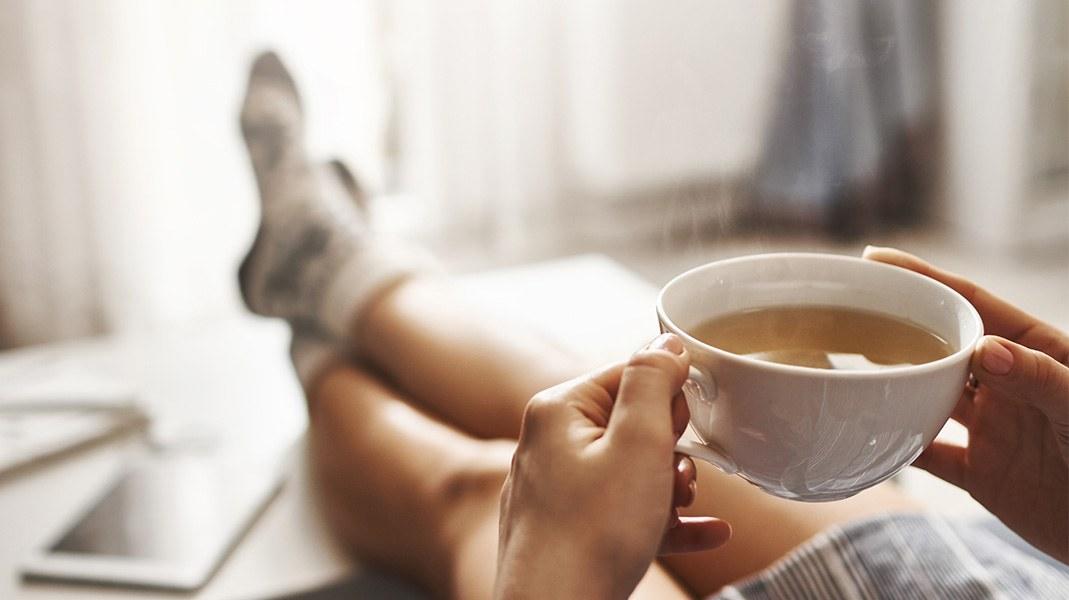
“Keep calm & carry on”… The famous British quote seems very apt today. Most of us have never experienced anything that affects societal functioning as extensively as Covid-19, with millions of people self-isolating or being told not to leave their house unless necessary.
The challenges vary depending on your age and health status, where you live, financial realities, what type of job you have, whether you have kids, etc. At a time like this, it’s tough to come up with meaningful wellness guidelines, without oversimplifying or overlooking people’s realities.
Yet, we all need to react, adapt, look after our own well-being, and be creative. Here are some thoughts.
What Can You Influence Right Now?
Differentiate between things that you cannot do anything about vs. things that you can affect – then focus on the latter!
This will have a positive effect on your mental well-being because the mind gets overwhelmed if it’s wrapped up in all the things that are causing you stress. The mind needs to have an action plan.
Sleep Enough!
- There is hardly anything that is as important as this. Sufficient, good-quality sleep helps you maintain immunity and resilience and is the best way to cope with the extra stress that the current situation is causing.
- Prioritize enough time for sleep and maintain a regular bed and wake-up schedule.
- Create a pre-bed routine. This is especially important now with an atmosphere of worry in the air (and the never-ending news cycle). Make a clear plan for when to turn off the news and start focusing on winding down.
- Stick to what works for you (e.g. read, music, TV, relax, knit) – or try something more “extreme” if your mind is especially restless. Experiment with meditation, slow stretching, relaxation music, deep breathing or evening audiobooks that help you sleep. I’ve personally found that listening to soothing music or a story can help clear my head, slow my heart rate and put me to sleep. Most of the time I end up listening to the same story over several nights because I never get to the end.
Physical Activity
- If your usual exercise routine involves going to the gym or group activity, you probably have to adjust and be creative. If you are sick, don’t exercise!
- If you are not sick, figure out a way to get some daily exercise to boost your resilience.
- If your gym is closed, now might be a good time to build your endurance base with walking, Nordic walking, hiking, jogging, cycling, or trail running. In most places, you are allowed to go outside, just not in big crowds.
- If you are confined inside, create some fun routines and challenges that can be done even in small spaces or with your kids: push-ups, sit-ups, jumping-jacks, squats, lunges, arm circles, good-morning exercise, Yoga moves, etc. Or try a seven-minute workout or some other routine that you can find online. Try inserting a different five-minute session mid-morning and mid-afternoon, to get a break from the computer.
- Accept that this might not be the time to make huge gains in your fitness. Instead, focus on finding good maintenance activities to keep your spirits high.
Nutrition
- Together with exercise and sleep, healthy nutrition is key for maintaining good immunity, energy and health. The body needs premium fuel to function optimally.
- Be creative and stock up on foods that you like and are easy to fix. Have enough healthy snacks around to avoid resorting to empty calories, but there’s nothing wrong with having a few comfort foods around too, for when you need a treat.
Recovery & Mindfulness
- Sleep is the key time to recover but try to manage your stress levels throughout the day and make sure you have a few moments when you are not multitasking, doing chores, listening to the news or worrying. Whatever works for you; something that you enjoy.
- If feeling overwhelmed, this is a great time to experiment with different mind-body routines. Breathing, relaxation, meditation, etc. A lot of options and tools are available online.
- For me, the best mindfulness lately has been time in the forest. It serves two purposes – I get some exercise, but even more importantly, I’m away from all devices, enjoying the sounds and sights of the outdoors. Even a short outing mid-work (see graph below) acts as an energizer and helps my focus.
I conducted the Firstbeat Lifestyle Assessment this week to see how I was adjusting to the current situation (remote work, closures, isolation, online instead of f-2-f), which is the reality for many of us for the time being. This type of data can be useful to visualize the effect of different activities and learn more about what works and maybe what doesn’t.
The 24-hr graph in the figure below is a good day for me. I managed to alternate intensive work with a few breaks and the rhythm stayed manageable to allow me to show some recovery during work. The day was followed by mostly good sleep, which I was happy to see.
Good thing I went to bed early, though, because after 5 am, I couldn’t quiet my mind or fall fully back asleep. The two 15-20-minute walks gave me moderate physical activity benefits – a reminder that it doesn’t take that much exercise to achieve significant health benefits.
However, this kind of balance is not automatic, no matter how much you know! The day after, I was constantly multitasking and interrupted by unexpected work calls, re-scheduling and demands.
At the end of the day, I had forgotten to take breaks (except for a short lunch) or go outside. I went on a longer walk after work and reminded myself that I need to be very mindful of planning the day in a sensible way.
We need to identify good practices that fit the current reality, maybe experiment a bit to see what works – and then find a way to follow through. I want to wish everyone all the best with the challenges that you are facing and loads of resilience and resolve to take care of yourself and those close to you in the best possible way.
Keep calm – and carry on!
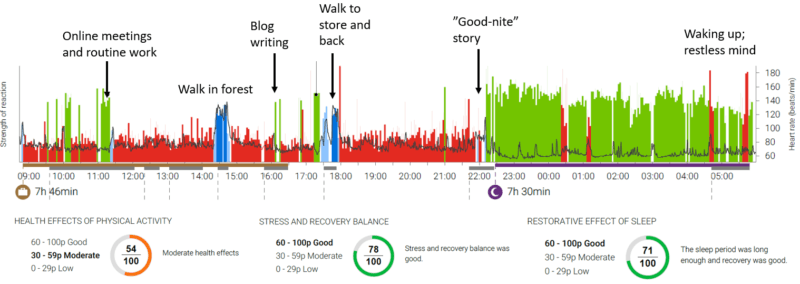
Fig. A 24h Firstbeat Lifestyle Assessment graph of a remote workday, showing a good balance between stress (red) and recovery (green) as well as moderate physical activity points from a couple of short walks.
Are you interested in learning more about Firstbeat Life? Click below to see how employers can utilize our well-being services.
You might also be interested in
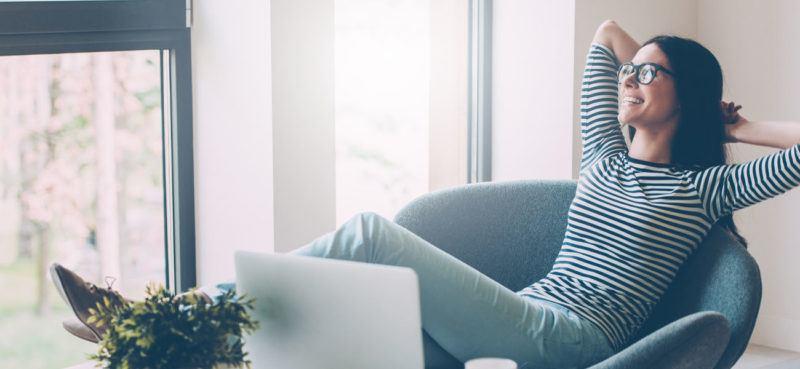
How to Make Working from Home Work for You
Put these steps in place and enjoy the benefits of remote working.
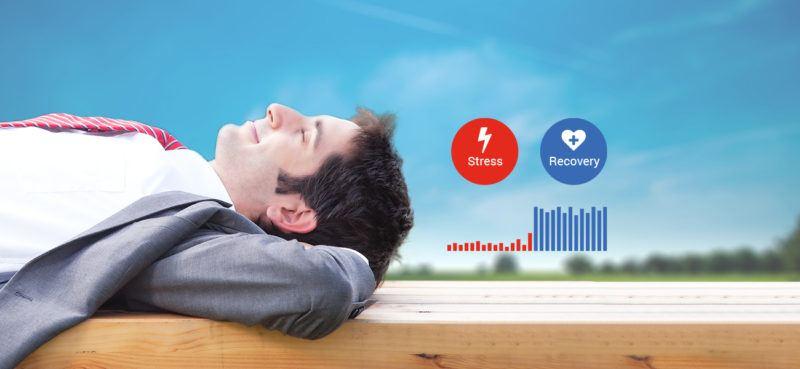
At the Heart of Stress and Recovery
Stress can be defined as a situation where the demands that a person is faced with are greater than the available resources. Stress can also be described as the body’s physical and mental adaptation to real or perceived change.
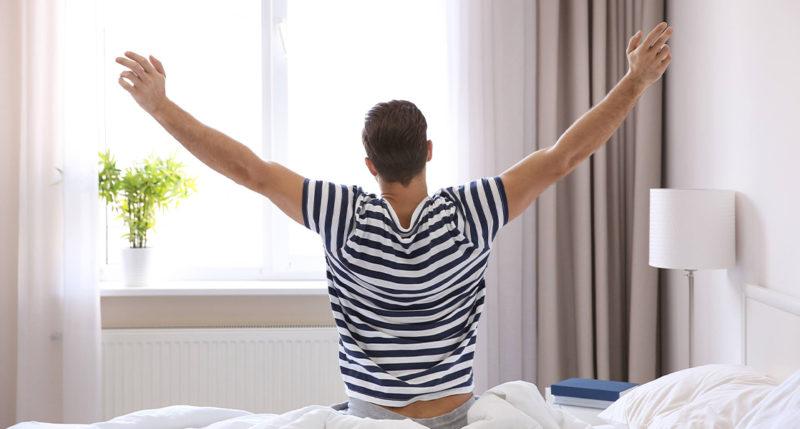
Reflections on Sleep: Keeping Things in Perspective & Moving Towards A Better Snooze
Sleep is hugely important for good health and performance. It’s a key cornerstone of wellness that needs to be taken seriously both at societal and individual level.

